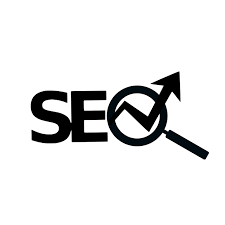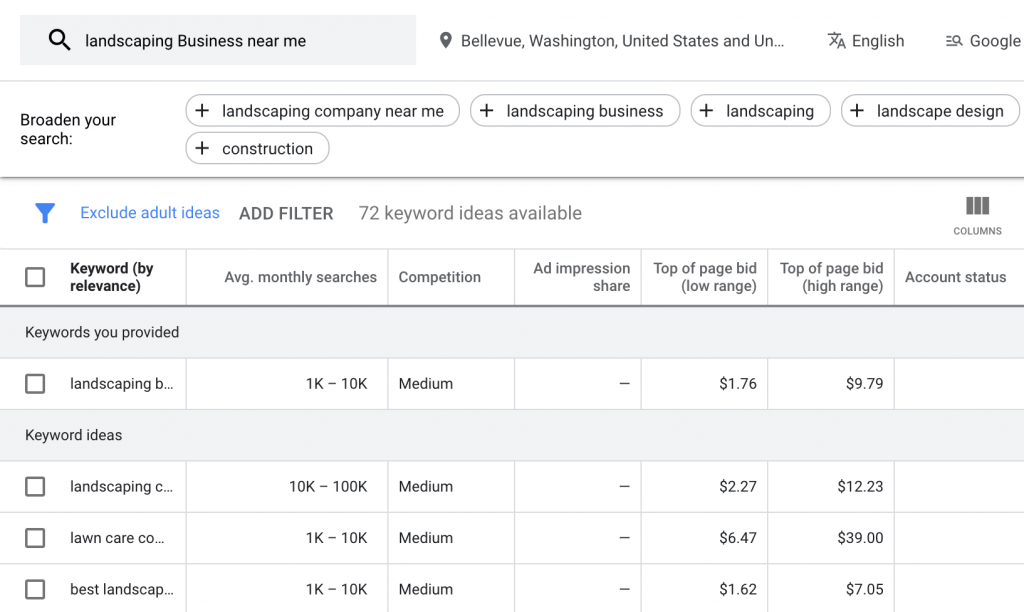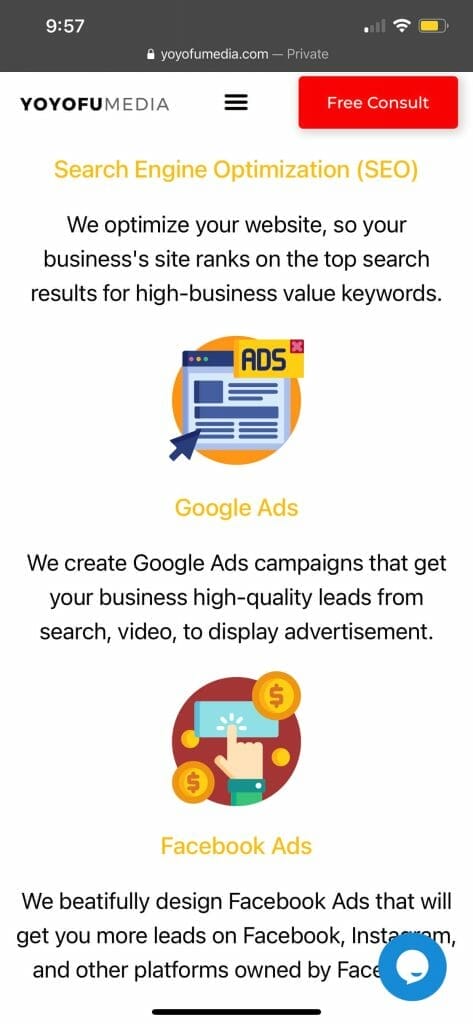SEO for landscapers is essential to driving organic traffic to your website, leading to new clients every month.
Nowadays, homeowners are going to Google first to find the best landscaping companies around them.
Utilizing SEO techniques for your landscaping company will allow your website to rank higher on the search results page compared to your competitors and get in front of these homeowners.
“The first five organic results for 67.60% of all clicks”
Seems like an easy decision to make that SEO for landscaping companies would be a good idea, as the majority of the customers would go to the first five companies.
What is SEO?
SEO stands for Search Engine Optimization. This is a strategy that marketers use in order to organically gain search engine traffic without having to use pay-per-click (PPC) like Google Ads.
Google will use algorithms to help determine how sites will rank on the search engine’s page. The quality of your website will be assessed based on these algorithms to figure out how you will rank.
In this guide, we will share with you the top factors to have a quality website that will help you drive more traffic to your website and also help increase revenue.

Difference Between SEO and Google Ads
Both SEO and Google Ads help businesses appear on Google, but the way they work is very different. Google Ads is a paid service where you bid on specific keywords, and your business shows up at the very top of search results in the “Sponsored” section. Every time someone clicks on your ad, you pay Google a set amount, known as pay-per-click (PPC). Your ads stop showing as soon as you stop paying.
SEO, on the other hand, focuses on improving your website and content so that Google naturally ranks you higher in the unpaid, or “organic,” search results. With SEO, you don’t pay for clicks, but it takes time and consistent work to build authority and move up in rankings. For landscapers, Google Ads can bring immediate traffic and leads, while SEO creates long-term visibility that continues to generate customers without paying per click.
Local SEO
Since landscaping is a service that depends on location, local SEO is especially important. Local SEO means making sure your business shows up when people in your area search for landscaping services. For example, if someone types “lawn care in Los Angeles” and your business is in Denver, local SEO helps your company appear in that search.
This includes using your city name in your website content, collecting reviews from local customers, and keeping your business information the same everywhere online. Local SEO helps landscapers connect with nearby homeowners who are actually ready to hire them, instead of random visitors from other states.

Google Business Profile (Previously Called Google My Business)
One of the most powerful free tools for landscapers is Google Business Profile, which used to be called Google My Business. This is the profile that appears when people search for a local business and see details like the company’s name, phone number, website, location, photos, and customer reviews.
Having a complete and optimized profile makes your landscaping company look more trustworthy and professional. You can add before-and-after photos of your projects, list your services, update your business hours, and even answer questions from potential customers. A strong Google Business Profile often shows up before regular websites, which means more people will see your business right away.
Why SEO is Important for Landscapers
SEO is important for landscapers because most customers start their search for services online. If your website doesn’t show up when they search for “yard cleanup near me” or “landscaping company in Los Angeles,” then they will likely find and hire your competitors instead.
SEO brings in steady leads, builds trust with potential clients, and helps you avoid relying only on paid ads. It also positions you as an expert because people often see businesses that appear on the first page of Google as the most reliable choices. In short, SEO makes sure that when someone in your area needs landscaping, they can easily find you.
Competitive Offer
Since landscaping is a competitive industry, SEO can help you stand out from other companies in your area. Many landscapers might rely only on word of mouth or ads, but if your website is optimized, you gain an advantage because you’re visible where customers are actively searching.
A strong SEO strategy can highlight your competitive offers, like free estimates, seasonal discounts, or eco-friendly landscaping options, and make sure these offers are front and center online. This not only helps attract more attention but also convinces people to choose your services over others. SEO gives you the upper hand in winning new clients and growing your business faster.
Track Keyword Ranking Using Serprobot
Once you’ve picked your target keywords, you need to monitor whether your website is actually showing up in search results. This is where Serprobot comes in. Serprobot is a free keyword rank tracker that lets you enter your keywords and see your website’s current position on Google.
For example, you can check whether your site ranks on page one for “landscaper in Los Angeles.” Tracking your keywords weekly or monthly helps you measure the success of your SEO and see where you need to make improvements. If you’re ranking lower than expected, it may be a sign that you need to improve content, get more backlinks, or optimize your website’s technical performance.
Understanding Search Intent for Landscapers
One of the most important parts of SEO is understanding search intent, which simply means the reason behind a person’s Google search. Not everyone searching for landscaping-related terms is ready to hire a landscaper right away. Some are just looking for tips, while others are actively trying to find a company in their area.
By knowing the different types of intent, landscapers can create the right type of content for the right type of searcher. This helps ensure that your website not only shows up in search results but also attracts visitors who are most likely to become paying customers.
Informational Intent
Informational intent means the searcher is just looking for information, not necessarily to hire anyone. Examples include “how to aerate a lawn” or “best flowers for a backyard garden.” While these searches don’t always lead directly to a sale, they are a great way for landscapers to build trust and authority.
By writing blog posts or guides that answer these questions, landscapers can bring potential customers to their site early in the research phase. Later, when those people decide they need professional help, they are more likely to hire the landscaper they have already learned from.
Navigational Intent
Navigational intent happens when someone is searching for a specific company or brand. For landscapers, this might look like “Green Leaf Landscaping reviews” or “BrightView Landscaping website.”
These searches usually mean the person already knows about your business and wants to learn more, such as checking your services, looking up your phone number, or reading testimonials. To capture these searches, landscapers should make sure their business name is easy to find on Google and that their Google Business Profile, website, and social media pages all show up with clear, updated information.
Commercial Intent
Commercial intent means the searcher is thinking about hiring a landscaper, but is still comparing options. Examples include “best landscaping company near me” or “top landscapers in Los Angeles.”
At this stage, people want to see reviews, pricing, photos of past work, and details about different services. Landscapers can win these searches by creating comparison pages, showcasing before-and-after galleries, and highlighting customer testimonials. Optimizing for commercial intent is crucial because it puts your company in front of people who are very close to making a decision.
Transactional Intent
Transactional intent is the most valuable type of search because it means the person is ready to take action. These are searches like “landscaper near me free estimate” or “book lawn mowing service in Los Angeles.”
The searcher already knows what they want; they just need the right company to do it. Landscapers should target transactional intent by having clear service pages, easy-to-use contact forms, and strong calls-to-action like “Request a Quote Today.” Ranking for transactional searches can bring in immediate leads and direct revenue because these users are prepared to hire right now.
Need Help Starting?
Understanding Keywords for Landscapers
When it comes to SEO, keywords are the backbone of your strategy. They are the exact words and phrases people type into Google when searching for services, answers, or solutions.
Monthly Search Volume
Monthly search volume is the average number of times a specific keyword is typed into Google each month. For example, a general keyword like “landscaping services” might get thousands of searches across the country, while something niche like “retaining wall installation in Los Angeles” might only be searched a few dozen times.
At first, it may seem like you should only chase high-volume keywords, but that can be misleading. High-volume keywords are more competitive and often dominated by large companies with massive SEO budgets. Landscapers can find big wins by targeting smaller-volume, local-specific terms that bring in qualified customers who are actually ready to hire. In short, volume shows potential traffic, but it’s not the only factor to consider.
Keyword Difficulty
Alongside volume, you need to understand keyword difficulty (KD). This metric shows how hard it would be to rank for a certain keyword based on competition. A keyword with high search volume almost always has high difficulty because many businesses are trying to rank for it.
For example, “landscaping services” has extremely high difficulty, while something like “organic lawn fertilization service in Los Angeles” may be much easier. Landscapers should aim for a mix: a few harder, high-volume keywords for long-term growth and easier, less competitive keywords for faster wins. Think of keyword difficulty as the “strength of the competition” you’ll be facing on Google.
Use Relevant Keywords for Your Landscaping Business
A common mistake is chasing keywords that don’t really connect to what you offer. Ranking for something broad like “gardening ideas” may bring traffic, but if you don’t sell gardening guides or products, that traffic won’t turn into leads.
Instead, landscapers should focus on relevant keywords tied directly to their services, things like “sod installation,” “mulching services,” “landscape lighting design,” or “commercial snow removal.” Relevance is critical because it ensures your traffic has intent. In other words, the people clicking on your site are actually interested in what you do, not just browsing random content.
Choosing the Right Target Keywords for Landscapers
When you’re ready to narrow down your focus, it’s time to select target keywords. These are the exact phrases you want your landscaping business to rank for. The best way to choose is to think like your customer: what are they typing into Google when they need your services? Someone typing “DIY backyard landscaping” is probably looking for free information, not a contractor.
But someone typing “landscaper near me” or “hardscaping company in Los Angeles” is actively searching for a professional to hire. The right target keywords will have local intent (since landscaping is a local service), clear buying signals, and a good balance of volume and difficulty.
Long-Tail Keywords
One of the best opportunities for landscapers lies in long-tail keywords. These are longer, more specific search terms, usually four or more words. An example would be “affordable lawn care service in Los Angeles” or “backyard patio paver installation near [neighborhood].”
Even though these keywords have lower search volume, they attract very high-quality leads. People searching long-tail keywords usually know exactly what they want, which means they are closer to making a purchase decision. Landscapers can dominate with long-tail keywords by creating service pages, blog posts, and FAQs that answer these very specific searches.
Short-Tail Keywords
On the other hand, short-tail keywords are broad terms made up of one to three words, such as “landscaping” or “lawn care.” These have much higher search volume but are extremely competitive. They also don’t always show buyer intent.
For example, someone searching just “landscaping” could be looking for ideas, tutorials, or even images, not necessarily a professional landscaper. While short-tail keywords are still valuable and should be part of your strategy, they work best when paired with long-tail keywords. Together, they give you visibility in broad searches while still capturing qualified leads from specific ones.
Keywords Research Tools
Keywords are how new clients will find your business. These are phrases, words, and search terms that they will use in the search query to discover what they are looking for. Before making any changes to your website, it’s important to do keyword research to find exactly what people are searching for within landscaping.
You want your keywords to fit around the different landscaping services you offer or even the location you would like to target. Google is smart enough to know how keywords are being used on your website. If you are just fitting keywords into areas that don’t make sense, this will cause your website to rank lower.
Google Keyword Planner:
A free tool within Google Ads that gives detailed keyword data, including monthly search volume, competition, and related keyword ideas. Even if you’re not running ads, you can use this tool for SEO planning.

Google’s Auto-Suggest (Autocomplete Predictions):
Start typing “landscaping” into the Google search bar, and it will suggest common searches people use, like “landscaping near me” or “landscaping ideas for small yards.” This gives you insight into real-world search behavior.

Google’s Related Searches:
At the bottom of every search page, Google shows related search terms people often use. These are perfect for finding keyword variations.

Ahrefs Free Keyword Generator:
Ahrefs is a paid SEO platform, but they also offer a free keyword generator where you can type in “landscaping” and instantly get dozens of keyword ideas, along with difficulty scores.

Why “landscaper near me” is a good keyword:
High Search Intent
When someone types “landscaper near me,” they are actively looking for professional landscaping services—whether for lawn care, garden design, or property maintenance. This shows transactional intent, meaning the searcher is ready to hire, not just gather information.
Local Relevance
The phrase includes “near me,” which makes it a local SEO keyword. People want landscapers in their immediate area, so ranking for this ensures your business shows up right when nearby homeowners and property managers are searching.
Consistent Demand
Landscaping needs are ongoing and seasonal, from spring cleanups to summer lawn care and fall leaf removal. This keyword has steady search volume year-round, keeping leads flowing regularly.
High Conversion Potential
Unlike informational searches like “how to mow a lawn,” this keyword targets people who prefer to hire a professional. That means a much higher chance of converting searches into paying clients.
Why “landscaper salary” is not a good keyword:
Low Business Value
People searching for “landscaper salary” are usually job seekers, students, or individuals curious about pay rates. They are not potential customers looking to hire a landscaping service, so this keyword has no direct value for generating leads or clients.
Irrelevant Search Intent
The intent here is career-focused, not service-focused. A landscaping company trying to attract new clients won’t benefit from ranking for this keyword, since it doesn’t connect with homeowners or businesses who need landscaping work done.
No Lead Generation Potential
Even if this keyword gets some search traffic, it won’t bring in qualified leads. Instead, it drives unqualified visitors who won’t convert into paying customers.
Better Alternatives Exist
Instead of salary-based terms, landscapers should focus on service-driven, local intent keywords like “landscaper near me,” “lawn care services Los Angeles,” or “yard cleanup near me.” These connect directly with people ready to hire.
Need Help With Choosing The Right Keywords?
On-Page Optimization For Your Landscaping Business
URL Slugs
A URL slug is the part of a web address that comes after the domain name, and it’s one of the first signals Google reads to understand what your page is about. Instead of having a messy link like https://www.lawnstarter.com/irvine-ca-landscaping/services?id=123, a clear slug like https://www.lawnstarter.com/irvine-ca-landscaping-services is better for both search engines and customers.
For landscapers, using slugs with keywords and locations such as /lawn-care-Los-Angeles or /patio-installation-Los-Angeles makes it easier for people searching in your area to find you. Clean, keyword-rich URL slugs improve rankings, make your website look more professional, and help potential clients know exactly what service the page covers.

Title Tags
Your title tag is the clickable headline that appears in Google search results, and it’s one of the most important on-page SEO factors. A good title tag should include your main keyword and your location, since landscaping is a local service.
For example: “Irvine, CA landscaping service at the click of a button.” This tells both search engines and users exactly what you do and where you do it. Title tags should stay under 60 characters so they don’t get cut off in search results. A strong, clear title tag not only helps you rank higher but also makes people more likely to click on your listing instead of a competitor’s.

Meta-description
Meta descriptions are the short text snippets under the title tag in search results. While they don’t directly affect rankings, they strongly influence whether someone clicks your page. A landscaper’s meta description should summarize services, highlight unique selling points, and include a call to action.
For example: “A new, easy way to get landscaping in Irvine. Choose from 50+ services including mowing, cleanups, installations, and more.” Keeping it under 160 characters ensures the whole description shows. A well-crafted meta description boosts your click-through rate (CTR), which indirectly supports better rankings and more leads.

Alt Tags
Alt tags describe the content of images to search engines and users with visual impairments. Since landscaping websites usually feature many photos of outdoor projects, using descriptive alt tags is crucial. Instead of generic tags like “image1.jpg,” use text such as “description of the picture.”
This helps Google index your images for image search results and improves overall SEO. It also provides another chance to include local keywords, which increases the likelihood of showing up when someone searches for landscaping ideas in their area.

Internal Links
Internal links connect one page on your website to another. For landscapers, this might mean linking from a blog post about “Best Landscaping Plants for Summer” to your services page for garden design. Internal linking helps search engines understand the structure of your website and spreads ranking power across different pages.
It also makes it easier for visitors to navigate your site and spend more time exploring your services, which improves user experience and conversion rates. A strong internal linking strategy ensures that no important page is left hidden or hard to find.
External Links
External links are links from your website to other reputable websites. While some landscapers worry that linking out sends people away, the truth is that external links boost credibility and trustworthiness.
For example, linking to a university’s gardening guide or a government site about water-efficient plants shows that your content is well-researched and reliable. Google rewards websites that point users to high-quality sources because it improves the overall experience. Just make sure your external links open in a new tab so visitors don’t completely leave your site.
Compress Large Image Files
Landscaping websites often rely heavily on before-and-after project photos, but large image files can slow down your site. Page speed is a direct ranking factor, and slow sites frustrate users, especially on mobile devices.
Compressing images with tools like TinyPNG or built-in website plugins reduces file size without losing quality. Faster-loading pages keep visitors engaged longer, increase conversions, and send positive signals to Google. For landscapers, balancing visual appeal with fast performance is key since your photos are often the main proof of your skills.
Improve Readability Level
Search engines favor websites that people can easily read and understand. If your landscaping site is filled with overly complex language or giant blocks of text, visitors may quickly leave, which hurts your rankings. To improve readability, use short sentences, bullet points, subheadings, and clear formatting.
Keep your tone conversational and target around an 8th-grade reading level, since most people want quick, simple answers when searching online. Adding visuals, spacing, and bold keywords also improves skimmability, making your site friendlier to both users and search engines.
Optimize Website
Finally, you need to optimize your entire website so it performs well in both search rankings and user experience. This means making sure your site is mobile-friendly, has clear navigation, loads quickly, and is free of broken links or duplicate content.
Optimization also includes structured data (schema) to help Google understand your services, and ensuring your site is secured with HTTPS. An optimized site not only improves your SEO but also builds trust with potential clients. For landscapers, a well-optimized website means more visitors stay, browse your projects, and ultimately contact you for services.

Struggling With On-Page Optimization?
Off-Page Optimization For Your Landscaping Business
The following section will be about off-page optimization. This will cover different strategies you should use outside of on-page optimization to grow your business and ranking on Google search engine results.
Backlinks
One of the most important parts of off-page SEO is building backlinks, which are links from other websites that point to your own. Google sees backlinks as a signal of trust and authority. The more high-quality websites that link to you, the more reliable your landscaping business looks.
For landscapers, backlinks can come from local news sites, home improvement blogs, suppliers, and directories. A strong backlink profile can help your website rank higher, especially for competitive keywords like “landscaping company near me” or “lawn care services.” Focus on earning links naturally through valuable content, partnerships, and local community involvement rather than using spammy link schemes that can hurt your rankings.
You can use Ahrefs backlink checker to know how many backlinks your website has.

Guest Posting
Guest posting means writing articles for other reputable websites in your industry or local community. This not only earns you backlinks but also puts your landscaping business in front of new audiences.
For example, you could write a guest post for a home improvement blog, real estate site, or gardening magazine about “Top Landscaping Trends for 2025” or “How to Prepare Your Yard for Spring.” Each article would include a link back to your website, helping with SEO and driving referral traffic. Guest posting builds credibility, establishes you as an expert, and strengthens your brand’s reputation in the landscaping field.
Content Marketing
While content is created on your website, content marketing extends that reach by promoting your materials across other platforms. For landscapers, this could mean sharing before-and-after photos of projects, posting lawn care tips on Pinterest or Instagram, or creating short YouTube videos about seasonal landscaping maintenance.
When your content is shared, linked to, or embedded on other websites, it increases brand awareness and generates backlinks. High-quality content also positions you as an authority, making potential customers more likely to trust you with their landscaping needs. Effective content marketing combines education, inspiration, and promotion to attract and convert new clients.
Social Media Marketing
Social media marketing plays a big role in off-page SEO because it helps amplify your content and build engagement. While social signals (likes, shares, comments) don’t directly affect rankings, they increase your online visibility and drive traffic to your site.
Landscapers can use platforms like Facebook, Instagram, TikTok, and Houzz to showcase projects, run promotions, and engage with potential clients. Posting regularly with photos, videos, and customer testimonials encourages sharing, which may result in more backlinks and exposure. Social media also gives your business a human face, building trust and creating opportunities for word-of-mouth referrals online.
You can check out our Social Media Marketing for Landscapers, Instagram Reels Marketing for Landscapers, and TikTok Ads for Landscapers to know more about what types of content to do for your business!

Partner Relationships
Relationships in business are key. Perhaps you have a relationship with your local wholesale garden supplier.
A good way to leverage this relationship is to reach out and see if you could be listed on their partner’s page, while you do the same for them. What this will do is build each other’s credibility within your community and refer new clients to each other.

AI SEO (LLM SEO, GEO, GSEO, ChatGPT SEO)

What is AI SEO?
AI SEO, sometimes called LLM SEO, GEO, GSEO, or ChatGPT SEO, is the process of optimizing your website so that AI-driven search engines and chatbots like ChatGPT, Google Gemini, and Perplexity recommend your business when people ask questions.
Instead of only focusing on traditional Google search results, AI SEO makes sure your content appears in AI-generated answers, summaries, and recommendations. For landscapers, this means when someone asks ChatGPT, “Who are the best landscaping companies near me?” or “What’s the best grass for my backyard?” your company has a better chance of being mentioned.
Optimizing for ChatGPT, Gemini, and Perplexity
The main goal of AI SEO is to provide high-quality, original, and trustworthy content that AI models can pull into their answers. These systems scan across the web, reading websites, videos, and PR articles to find useful information to summarize. To optimize for AI search:
-
Publish original insights and project examples that aren’t found everywhere else.
-
Add FAQs, guides, and case studies that directly answer common questions.
-
Share content across multiple formats (text, video, PR articles) because AI tools pull from all sources, not just web pages.
-
Keep your website structure clean so it’s easy for AI crawlers to understand what services you offer.
Similarities Between AI SEO and Traditional SEO
There are many similarities between traditional SEO and AI SEO. Both require high-quality content, keyword optimization, backlinks, and technical improvements to rank well. Whether you’re trying to show up on Google’s first page or in ChatGPT’s response box, you need to provide information that is relevant, clear, and trustworthy.
For example, both Google and AI models prioritize websites that are mobile-friendly, secure, and full of useful information. In short, the foundations are the same: good content and good website practices.
Differences Between AI SEO and Traditional SEO
The differences come from how AI models decide what to show. Traditional SEO is based heavily on keywords, backlinks, and click-through rates, while AI SEO prioritizes new, unique, and valuable insights.
Content that looks exactly like everything else online doesn’t rank as well in AI-driven tools. The more original data, real-world examples, or unique case studies you provide, the more likely AI is to highlight your business. For landscapers, sharing actual project photos, client stories, and step-by-step processes gives AI something new that generic “landscaping tips” blogs do not.
Why Original Information Matters
AI models already have access to a massive amount of general landscaping advice. If your content is just another “10 tips for lawn care” article, it won’t stand out. But if you publish unique before-and-after case studies, personal insights, or locally relevant guides, AI has new information to include in its summaries. The more new and original content you provide, the higher your chances of being cited in AI-generated answers. This is especially powerful for service businesses because it builds both visibility and credibility.
The Role of YouTube Videos and PR Articles
AI search tools don’t just pull from websites; they also summarize YouTube videos and PR articles. For landscapers, this means uploading short videos on topics like “How to prepare your yard for spring in Los Angeles” or showcasing a completed project can increase visibility. Similarly, press releases or PR features about your business on news sites add more unique sources for AI to scan. The broader your digital footprint, the more opportunities you have to appear in AI-generated answers.
Different AI Systems Prioritize Different Things
Not all AI search tools work the same way. Different AI platforms prioritize different signals when deciding what content to recommend:
-
ChatGPT prioritizes trusted, widely cited sources with strong clarity and detailed answers. It favors websites that provide original examples, structured content, and easy-to-read formatting.
-
Gemini (Google’s AI) leans heavily on Google’s existing search data and rankings. If your business already performs well in traditional SEO, Gemini is more likely to include you in its answers.
- Perplexity prioritizes fresh content and direct citations from reliable websites. It often links directly to the sources it pulls from, making up-to-date blog posts, FAQs, and PR articles extremely valuable.
Technical SEO for Landscapers
Website Security (HTTPS)
Security is one of the most basic yet essential aspects of technical SEO. Landscapers must ensure their website uses HTTPS instead of HTTP.

This not only protects visitor data but also builds trust with potential clients. Google gives ranking preference to secure websites, so having an SSL certificate in place is non-negotiable. A secure site also signals professionalism, which is especially important in service industries like landscaping.
Page Speed
A slow-loading website can drive potential customers away before they even see your landscaping portfolio. Since many visitors browse on mobile devices, fast page speed is crucial.
Compressing large image files (common in landscaping websites with high-quality photos), enabling browser caching, and using a reliable hosting provider can dramatically improve load times. Google uses page speed as a ranking factor, so optimizing this area directly impacts visibility.
Mobile-Friendly Website
In 2020 alone, more than 50% of online traffic came from a mobile device. With Google switching to mobile-first indexing, this means that there is more weight on your mobile site than on your desktop site.

The majority of local searches for landscapers happen on mobile. A mobile-friendly design ensures that visitors can easily navigate your services, view your gallery, and contact you without pinching or zooming. Google’s mobile-first indexing means that the mobile version of your website is the primary version considered for ranking, making mobile optimization an absolute priority.
Keyword Cannibalization
Landscaping businesses often create multiple service pages like lawn care, hardscaping, and garden design that accidentally compete for the same keyword. This keyword cannibalization confuses search engines about which page should rank. The solution is to consolidate overlapping content and ensure each page targets a unique keyword focus, giving you stronger rankings across multiple services.
Fix Duplicate Content
Duplicate content, such as repeating service descriptions across different city pages, can harm your SEO. Landscapers targeting multiple locations should create unique content for each page, highlighting area-specific services or projects completed in that region. This prevents search engines from seeing your pages as redundant and boosts your chances of ranking in different locations.
Fix Broken Links
Broken links, whether internal or external, create a poor user experience and harm SEO. Landscapers should regularly audit their websites to find and fix 404 errors or outdated links. A site free of broken links helps both users and search engines crawl content smoothly, which improves rankings.
Improve User Experience (UX)
User experience goes beyond design; it’s about making it simple for visitors to find information. Clear navigation, well-organized service pages, high-quality project images, and easy-to-use contact forms all contribute to better UX. When visitors stay longer and engage more, search engines see this as a signal that your landscaping website is helpful and authoritative.
Analytics and Monitoring Your Website
Without data, it’s impossible to know what’s working. Tools like Google Analytics and Google Search Console let landscapers track keyword rankings, traffic sources, bounce rates, and conversions. Monitoring this data regularly helps identify issues such as underperforming pages, seasonal search trends, or areas where more content is needed.
At YoYoFu Media, We Can Help You With Your SEO!
Schedule Your Free SEO Consultation!
Common SEO Mistakes to Avoid for Landscapers
Keyword Stuffing and Over-Optimization
One of the biggest mistakes landscapers make is trying to force keywords into every sentence. For example, repeating “landscaping services near me” ten times on one page not only makes the content sound unnatural but can also trigger search engines to view it as spam. This practice, called keyword stuffing, hurts both rankings and readability.
Instead, landscapers should focus on writing natural, informative content that flows well and only includes keywords where they fit organically. Google’s algorithms are advanced enough to recognize context, so well-written descriptions of your lawn care, hardscaping, or garden design services will perform far better than keyword-heavy pages.
Neglecting Mobile Optimization
Since most people search for landscaping services from their phones, ignoring mobile optimization is one of the fastest ways to lose potential customers. A website that isn’t responsive can cause visitors to leave immediately if text is too small, buttons are hard to tap, or images don’t load properly.
Not only does this reduce inquiries, but it also sends negative engagement signals to Google, which lowers your rankings. Landscapers should ensure their site is designed with a mobile-first approach, meaning it looks clean, loads quickly, and is easy to navigate on all screen sizes.
Ignoring User Experience (UX)
Another common mistake is focusing only on keywords and rankings while forgetting about user experience (UX). Even if your website ranks well, poor navigation, cluttered design, or confusing service pages can frustrate visitors and drive them away.
For landscapers, UX is especially important because clients want to browse portfolios, read testimonials, and request quotes with minimal effort. A good landscaping website should highlight before-and-after project photos, provide clear service categories, and include strong calls-to-action like “Get a Free Estimate.” Ignoring UX not only costs you leads but also signals to search engines that your site isn’t valuable to users, which can drop your rankings over time.
Optimizing SEO For Landscapers
Just like technology, SEO is always changing and adapting. The changes you make today may not be as effective a couple of months down the road; that is why it’s important to stay up to date and track your progress.
A tool we recommend using is Google Search Console. This track measures like site traffic, the number of clicks, impressions, what search queries you show up for, and where you stand on the search engine results page. Taking the analytics they give you will help make educated decisions about what needs to be done next in order to keep driving new customers to your business.
Conclusion
SEO is definitely a time commitment, but the return on investment it has compared to pay-per-click (PPC) is what makes it worth it. When doing SEO, people expect results instantly.
This is false as it takes time for the Google algorithm to update your SERP rank and for you to make adjustments. If you are willing to have the patience and time investment, then SEO will be a great fit for your landscaping company.
Need Help With SEO?






